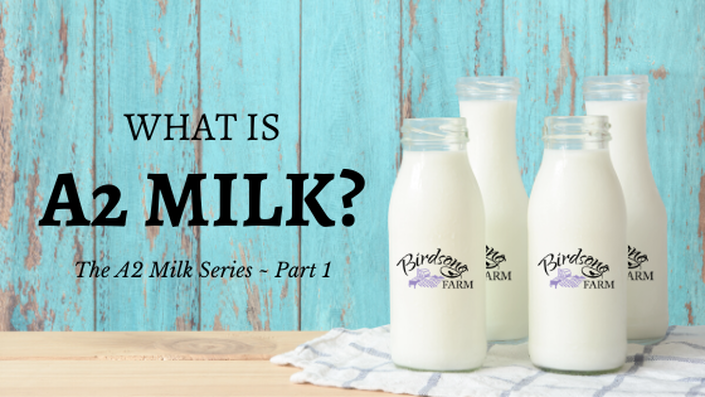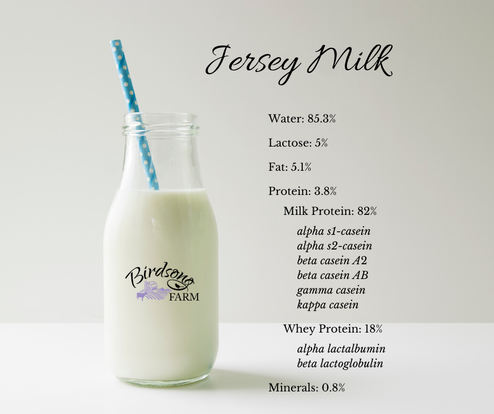|
Interest in Beta Casein A2 has skyrocketed since I started testing my cows for this gene back in 2011, so I thought it was time to write a series of blog posts on the topic. In this post, I describe the composition of milk and the Beta Casein A2 gene and its variants, address the health claims and a common misconception about A2 milk, and discuss how Beta Casein variants may affect cheesemaking. Milk composition and the A2 gene Milk is composed of water, lactose, fat, protein, and minerals. The protein content of milk ranges from about 3.1% in Holsteins to roughly 3.8% in Jerseys. Regardless of breed, there are six proteins found in milk: four milk (or casein) proteins—Alpha Casein, Beta Casein, Gamma Casein, and Kappa Casein—and two whey proteins—Alpha Lactalbumin and Beta Lactoglobulin. Beta Caseins account for about 35% of the casein in milk, and 28.7% of total protein. Beta-casein A2 is a chain of 209 amino acids produced by the CSN2 gene. There are 15 known variants of the A2 gene: A1, A2, A3, B, C, D, E, F, G, H1, H2, I, J, K, and L. The A2 gene has proline as the amino acid in position 67 (Pro67), while the A1 gene has histidine (His67). Based on the amino acid in position 67, twelve of the fifteen variants have been classified into two groups: A1 and A2. The A1 variants are B, C, F, and G, while the A2 variants are A3, H1, H2, I, J, K, and L. These variants are not identical to A1 or A2 but scientists think they act like A1 or A2 because of the amino acid (histidine or proline) in position 67. Health claims When you drink A1 milk, it releases a bioactive peptide called beta-casomorphin 7 (BCM-7) at levels that are four times higher than those found in A2 milk. Scientists think that these high levels of BCM-7 may cause adverse health effects and chronic diseases in humans. There is anecdotal evidence as well as data from several small human studies, which indicates that about 1 in 4 people are sensitive to the A1 protein, and drinking A1 milk will cause digestive upsets. (In fact, my husband recently discovered that he is sensitive to the A1 protein.) However, the claims that A1 milk can cause autoimmune and cardiovascular diseases, neurological disorders, and type-1 diabetes are questionable. Nearly all of the studies were conducted in vitro or on rodents. There is a potential conflict of interest as well since the A2 Milk Corporation funded a lot of the research, or employees and consultants of the company conducted it. (The A2 Milk Corporation owns the patent for the test as well as the trademark for the name 'A2 Milk'.) Every study and research paper that I read used phrases like 'may cause,' 'may be associated,' 'possible link,' and 'potential risk' when addressing the health claims. Almost every paper ended with a statement that further research and human trials are needed to prove the A1/A2 hypothesis. A common misconception A common misconception is that A1 milk causes lactose intolerance, but all milk has around 5% lactose, whether it's from a cow that is A1A1, A1A2, or A2A2. Also, lactose is a carbohydrate, while Beta Casein is a protein. Approximately 1 in 6 people have lactose intolerance. This means that they do not produce enough lactase, which is an enzyme that splits lactose into glucose and galactose. Someone who is genuinely lactose intolerant will not be able to digest any milk well without first adding lactase to it. A lot of people assume that they are lactose intolerant if they can't digest milk well, when they may be A1 sensitive; after all, A1 sensitivity is more common than lactose intolerance. Someone who is A1 sensitive will suddenly be able to enjoy milk again if they switch to A2 milk. Beta Casein in cheesemaking
Beta Casein plays a critical role in the cheesemaking process and affects both yield and quality. The B variant is characterized by an increase in milk casein content and a smaller casein micelle size, which improves the rennet coagulation properties of milk and increases cheese yield. The A1 and A2 variants can be associated with small or large casein micelle size, but the A1 variant has better rennet coagulation properties. Are you familiar with A2 milk? Do you drink A2 milk, and have you experienced any health benefits from it? If you're a farmer, do you test or breed for the A2 gene? Leave a comment below and let me know!
12 Comments
10/1/2020 07:22:21 pm
Thank you for your precice explanation. Each time I read more research I understand a bit more. I breed Purebred Mini Jerseys, intentionally choosing A2 as one of the many traits we find desirable. I look forward to more of your articles.
Reply
30/1/2020 09:24:16 pm
Very well captured, thanks for giving interesting insights on A1 A2 Gene, I believe articles such as these will remove a lot of misconceptions people have.
Reply
Kimberley
9/2/2020 04:43:43 am
Well said. A few years ago we moved back to the USA and one of the first animals we purchased was a double A2 Guernsey. Drinking raw, A2 made such a huge difference for our family. We have shared it with as many people as possible. Surprising few people know the benefits of A2 milk. I keep seeing dairy farms closing in our area and can't help but think we could avoid this if more people, to include farmers knew about A2.
Reply
Karen Thomas
12/2/2020 10:12:28 am
This is so interesting, thanks so much for putting it out there. I’m finally starting to understand this topic, but still not sure about some parts! I have a cow whose Beta Casein result is A2/B. But the test also says,”In the A2C nomenclature for A2 genotyping, the Beta Casein above corresponds to A1/A2.” I knew she was A1/A2, but the B thing threw me, lol. Is her milk favorable for cheese, is that what it means? I love her either way, it’s just so murky to newbies!
Reply
25/3/2020 04:06:45 pm
There is a study that shows that the B variant of Beta Casein A2 is better for cheesemaking than A1 or A2. However, if you're really looking for milk that is favourable for making cheese, you'll want to test your cow for Kappa Casein as this milk protein has the most significant impact on cheese yield out of all the milk and whey proteins found in milk.
Reply
Steve
15/10/2022 10:08:18 am
Hello Naomi,
Reply
1/12/2022 06:03:42 am
Do you sell the babies? If so, how much are they and what state are you in?
Reply
6/12/2022 07:46:41 am
Hi Betty,
Reply
Melissa F. Bishop
6/1/2024 04:50:12 pm
Hi. I'm a cardiac nurse and a Jersey milker. My comment is not meant for public posting. I have looked at these few studies, Chinese, funded by an A2a2 business out of New Zealand. Asian people were not cow keepers and most cannot digest lactose. Ancient Northern Europeans kept dairy cows and digest milk just fine, A1 or not.
Reply
Melissa F. Bishop
6/1/2024 04:37:20 pm
Reply
Leave a Reply. |
Categories
All
Archives
January 2020
|

